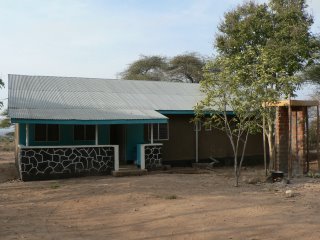
Mary from MWEDO and their driver threw my morning off by being so un-African and arriving on-time for our journey to Longido. I was expecting a call on my cell phone about 9:30a.m. saying they were on their way but, no, they arrived at 9:00a.m. sharp. Luckily I had packed before I left to find an internet café to upload another entry. I’d had only half a cup of coffee in my room. They waited while I hurried to the Bamboo and picked up two samosas for myself and water to go for all of us.
Some fields just outside the city still looked damp from yesterday’s rain, but as we drove on the dust in the fields swirled and only got worse as we approached Longido. We passed one Thompson’s Gazelle and a few donkey. In the distance on the hillsides children were grazing cattle on what little scrub there was. The drive was pleasant and quiet since Mary and the driver were mainly Swahili speaking. I did ask Mary what had happened to Penina, the Community Development Officer from MWEDO we had met with last year. We received word of her death in November. Mary said Penina had ulcers and suffered for about the last month before her death. She was hospitalized for three days, then died. I felt her absence keenly on Friday when I was at MWEDO offices.
We stopped at the ADP to drop off my things and call Baraka so he could begin his duties as my translator and guide. He was so thrilled to see me and could not hide his great broad smile as he approached. We decided to go in search of the fundi, since we had met the Dean of Students from Longido Secondary School on the road and were told this would not be a good to visit the school. We picked up the fundi at Café La Mama’s and headed to the banda site. A dozen bead makers of various ages were stringing beads in the shade under the rustic wooden stands where jewelry was displayed, and they rose to warmly greet us. Then coco, an old grandmother friend, arrived and gave me a big warm hug. It was so good to see her again. She looks the same: strong, weathered, head shaven, and happy wrinkles around her eyes. Familiar Maasai smells of sweat and dung hung on the air.
The new banda will be built directly behind the old one. The present banda will be taken down so the road can eventually be widened. Some of the materials from the old structure will be re-used around the new one. The new banda will be approximately 10 meters across and 5 meters deep. The fundi explained how he would build it and I asked the women if they were in agreement with the plans. They vocalized ‘yes’ seeming to understand my question. I told the women that the fundi agreed that the new structure would be completed by the time I left, in six weeks, and they began clapping together. I said I would stop by regularly to see the progress and take photographs.
After a lunch of rice, beans, and some meat, Baraka walked me to the ADP about 3:00 p.m. I needed a siesta. The guest house I am staying in is located on the grounds of the World Vision Area Development Program (ADP) compound, just inside the entrance on the right. I have the entire building to myself. One day it will be able to accommodate eight or ten people but for now only two rooms have single beds in them. The walls are completely unadorned and the cracked cement floors unpainted. There is a feeling the place is in transition, just like the ADP. Cement bags and building materials are scattered throughout. No matter how often the place is cleaned, a light coat of dust covers everything. The spacious living room area has two wooden sofas and a chair with bright red cushions. The bathroom is divided into two: One side has a porcelain toilet in the cement floor that would flush if there was water flowing into the tank but there is not. I will manually flush by throwing water into it. The other is a bare cement room with a metal shower head above and a small hole in the floor for drainage. Here I will have a daily “bucket shower”.
The cement veranda in front has two oil drums on it. One looks like it is used to mix cement. The other has some water in the bottom. I assumed it was for mixing the cement until two Maasai warriors wheeled a cart full of yellow plastic water containers to my door, emptying them into the rusted water drum. This was water for washing my clothes and my body. A red brick tower is being constructed near the veranda. Soon – perhaps even during my stay - it will hold a large black poly tank for collecting rainwater and the drums will no longer be needed.
More rice and beans for supper at Mama’s and I settled into my bed for the night under the most amazing roof of stars I have ever seen.

No comments:
Post a Comment